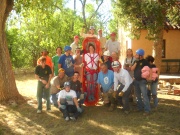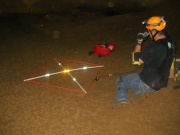OCR, Fort Stanton, June 2010
From LagWiki
| Line 13: | Line 13: | ||
[[File:Caving_-_Ft._Stanton_6-10_OCR_094.JPG|thumb|One of the practice litter teams]] | [[File:Caving_-_Ft._Stanton_6-10_OCR_094.JPG|thumb|One of the practice litter teams]] | ||
| - | The first day began with classroom training conducted by various instructors each taking turns with different subjects. The instruction was fast paced, long and the cave topics seemed to be difficult for the non-cavers in the group who were often completely unfamiliar with the cave environment. The rescue management was new to me and I found that portion difficult to understand. But, the instructors made it very enjoyable and I soon found myself grasping at least the high level view of what a major rescue entails. Late in the afternoon, we practiced packaging patients into litters and then went outside to practice various techniques of transporting the loaded litters through | + | The first day began with classroom training conducted by various instructors, each taking turns with different subjects. The instruction was fast paced, long, and the cave topics seemed to be difficult for the non-cavers in the group who were often completely unfamiliar with the cave environment. The rescue management information was new to me and I found that portion difficult to understand. But, the instructors made it very enjoyable and I soon found myself grasping at least the high level view of what a major rescue entails. Late in the afternoon, we practiced packaging patients into litters and then went outside to practice various techniques of transporting the loaded litters through obstacles. The obstacles included passing the patient under cars, through bushes and ropes as well as various imaginary obstacles. At the end of the day, a few of us went into the court yard at the historic fort to practice pickoffs with ropes rigged in the trees. |
On Sunday morning, we met at the cave for a mock rescue. The scenario involved two individuals who had a Hell Hole permit and were late in returning from the cave. Tammy was quickly recruited (railroaded is more like it) into being the Incident Commander and she quickly organized a hasty team to do a quick search through the cave to the Hell Hole gate to check to see if the lock was on the inside or outside of the gate. Meanwhile, the trained search and rescue personnel arrived and took over command. Tammy was then assigned to monitor the gate and to check everyone in and out of the cave. | On Sunday morning, we met at the cave for a mock rescue. The scenario involved two individuals who had a Hell Hole permit and were late in returning from the cave. Tammy was quickly recruited (railroaded is more like it) into being the Incident Commander and she quickly organized a hasty team to do a quick search through the cave to the Hell Hole gate to check to see if the lock was on the inside or outside of the gate. Meanwhile, the trained search and rescue personnel arrived and took over command. Tammy was then assigned to monitor the gate and to check everyone in and out of the cave. | ||
Revision as of 04:36, 6 July 2010
| Orientation to cave rescue training | |
|---|---|
| Location | Fort Stanton |
| Author | William Tucker |
| Date | June 19-20, 2010 |
Tammy and I were excited about attending an Orientation to Cave Rescue event hosted by NCRC at Fort Stanton cave. This would be our first exposure to formal cave rescue training though we have done mock rescues in the past. Immediately after returning from three days of cave management discussions, we loaded up our camper and headed to Fort Stanton Cave.
We arrived at the Bunk House well after dark and greeted those who had already gathered. The only one we knew was Janice Tucker, a caver from New Mexico.
There were about 40 people in the training. Most of those were search and rescue personnel. Only a few cavers were there. The instructors were cavers and included Bob Rogers, Pat Seiser and Tom Bemis among others.
The first day began with classroom training conducted by various instructors, each taking turns with different subjects. The instruction was fast paced, long, and the cave topics seemed to be difficult for the non-cavers in the group who were often completely unfamiliar with the cave environment. The rescue management information was new to me and I found that portion difficult to understand. But, the instructors made it very enjoyable and I soon found myself grasping at least the high level view of what a major rescue entails. Late in the afternoon, we practiced packaging patients into litters and then went outside to practice various techniques of transporting the loaded litters through obstacles. The obstacles included passing the patient under cars, through bushes and ropes as well as various imaginary obstacles. At the end of the day, a few of us went into the court yard at the historic fort to practice pickoffs with ropes rigged in the trees.
On Sunday morning, we met at the cave for a mock rescue. The scenario involved two individuals who had a Hell Hole permit and were late in returning from the cave. Tammy was quickly recruited (railroaded is more like it) into being the Incident Commander and she quickly organized a hasty team to do a quick search through the cave to the Hell Hole gate to check to see if the lock was on the inside or outside of the gate. Meanwhile, the trained search and rescue personnel arrived and took over command. Tammy was then assigned to monitor the gate and to check everyone in and out of the cave.
I was assigned to an in-cave radio team led by Mike Bilbo and we followed the progress of the two rescues through the cave setting up radio communications at prescribed locations to communicate with our sister team on the surface. They had to follow us around to well know GPS coordinates in order for the low frequency radios to work. At each location, we unpackaged and assembled the antennae and established communications with the surface to rely important information and instructions needed by the commanders on the surface and the rescue personnel in the cave.
It was a long day but we successfully "rescued" two injured cavers on litters; one from the far side of Crystal Crawl and one from near the Devil's Backbone.
It was an enjoyable and informative weekend. I came back with a new resolve to self rescue (should I ever need to do so) if at all possible.
The in cave radios were of limited success. We eventually established communications at every site we tried but some locations were very difficult to establish and then communications were difficult with relaying detailed information become a hit or miss situation. I believe that in-cave radios have their place where stringing communication wire is difficult or impossible but they are not the most reliable form of communication. The surface team also had difficulties with a thunderstorm moving through late in the day that shut them down stopping radio communication altogether for safety reasons.
Finally, we all met together at the Bunk House for debriefing to discuss the good and the bad learned from the mock rescue.
Over all, it was a very good weekend of mock rescue training and I look forward to an opportunity to participate in more indepth cave rescue training with NCRC.


